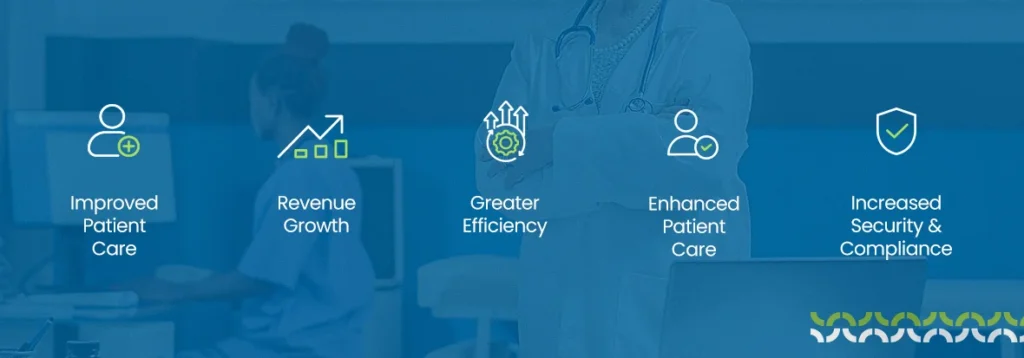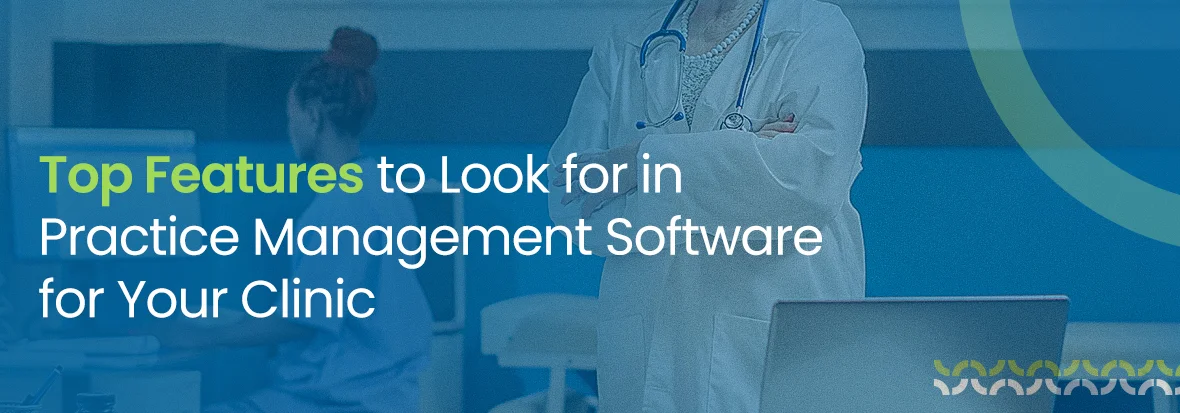For any healthcare organization, patient satisfaction, care, and revenue cycle boost are the most important things, and for that, choosing the right practice management software can make a big difference in your smooth practices run. In this modern age of technology, the adoption of Practice Management Software (PMS) has emerged as an essential tool for medical professionals to optimize and streamline all administrative, financial, and clinical tasks. Although practice management software works behind the scenes for medical practices, it is still a must to research before getting it. This blog will help you to know all the essential features of PMS that your organization may be in need of.
What is Practice Management Software and Why Do You Need It?
Practice management software is a solution that oversees the day-to-day operations of a medical practice and administrational tasks, including patient scheduling, billing, invoices, insurance claims, auto-denial management, electronic healthcare records, and more. PMS software solution serves as an intricate web to ensure clinics run smoothly with all the financial tasks without any inefficiencies and errors. So that the practices are only concerned with patient care while simplifying and reducing the administrative burden.

Top features to Look for When Selecting the Right Software
These top features in Practice Management Software will ensure your practice operates seamlessly and stays ahead in patient satisfaction:
User-Friendly Interface
Your software should make things easier, not harder. A user-friendly interface ensures your team can easily navigate all the typical tasks of a medical practice with customizable dashboard features that align with your workflow. When the interface is easy to use, employees can spend less time navigating and more time completing essential tasks. The customizable interface option also helps your practice management software to seamlessly integrate with other tools and cloud-based systems, such as EHRs, billing software, insurance company databases, and communication platforms. Eventually, that helps to streamline the workflow of complex data and reduce the need to switch between multiple systems. For example, front desk staff might prioritize scheduling tools while billers focus on claim statuses and financial summaries.
Key Benefits Include:
- Enhanced Productivity
- Reduced Errors
- Improved Staff Satisfaction
- Better Patient Experience
EHR and Patient Portal
Integrated EHR functionality is an efficient fundamental for practice management. These systems serve as a backbone for secure patient demographics, medical history, medications, lab results, and treatment records that are critical for effective patient care. It helps to eliminate the need for paper records and reduces the risk factor of data duplication or loss. Through the database, healthcare providers can easily retrieve patient data in case any mishap happens, or even get remote access from anywhere as per emergency patient needs. It also supports interoperability, allowing data sharing, especially in the case when multiple providers are seeing one single patient. But all these EHR systems prioritize patient data security as per the compliances and regulations of HIPAA.
Moreover, with this EHR integration, a patient portal is a vital extension, offering patients a direct, secure channel to interact with their healthcare providers. Even patients can schedule or cancel appointments online through these individual portals, which helps to reduce the work for front desk staff. They can also view their lab results, diagnosis, medication, billing payments, and visit summaries, fostering transparency and trust.
With a Patient Portal:
- Centralized Patient Profiles
- Access their complete Medical History
- Schedule Appointments
- Direct Communication
Patient Scheduling
Efficient patient scheduling and appointments play a crucial role in the smooth operations of healthcare practices. Advanced PMS systems offer automated appointment reminders for patient convenience, such as 24-48 hour notifications, which can be sent via SMS, to ensure patients are notified in advance of their scheduled appointments. Moreover, PMS systems provide real-time availability, allowing staff and patients to view available dates to consult with their specialists and prevent issues such as double booking or not getting the appointment dates.
Additionally, for patients who require regular visits with follow-ups for any complex or emergency specialties like ob gyn billing services, billing for pain management services, wound care billing, and physical therapy medical billing services, appointments can be set up automatically, saving time for both patients and providers. It also helps streamline busy day workflow management, coordinating the care team to avoid scheduling conflicts and ensuring patients are seen in a timely manner. These comprehensive scheduling features ultimately lead to more effective resource management, improved patient outcomes, and a better overall patient experience.
Medical Billing and Financial Management
Medical billing and financial management are essential aspects of any healthcare organization’s revenue cycle, and using the right practice management software according to your billing needs can significantly streamline the process. Automated billing and claims submissions reduce the chances of human errors that result in delayed payments and rejections. With an integrated RCM system automatically generates claims based on patient data and treatment codes, ensuring accuracy and compliance with payer requirements. It also helps to track down the payments and allows for easy reconciliation of outstanding balances, offering real-time visibility into the financial status.
Choosing the right PMS? we’ll help you decide
Key Capabilities Include:
- Automated Claims Submission
- Payment Tracking
- Denial Management
- Integrated Payment Processing
- Revenue Cycle Management
Automating these above-mentioned key capabilities helps the healthcare providers with all the billing processes and overall finance performances to ensure the clinics or hospitals remain financially stable and compliant with payer regulations. It contributes to a smoother, more efficient revenue cycle and ultimately supports the clinic’s long-term success.
Detailed Reporting and Analytics
Detailed reporting and analytics are vital features of a robust Practice Management System, enabling healthcare providers to make informed, data-driven decisions. These systems offer comprehensive reporting tools that provide deep insights into key areas such as:
- Financial Performance (paid, denied, in process, rejected)
- Customizable Dashboards
- Preformatted Reports for Improvement
Basically, analyzing these insights will enhance the overall performance to boost profitability ratio and revenue with less chance of claim denials in the billing process.
Integration with Other Systems
Practice Management Software always has a crucial feature of seamless integrations with other systems, to ensure that the healthcare ecosystem works together. For clinics and healthcare providers, having a PMS that integrates smoothly with regulatory compliances, codes updates platforms (e.g. ICD-10, CPT, HCPCS), laboratories, pharmacy, and insurance companies, telehealth for improving efficiency and reducing administrative burdens. When systems are interlinked data can flow automatically without the hassle of manual inputs, and minimize errors across the practice’s operations.
Tip:
A HIPAA-compliant PMS integrates secure patient portals and encrypted claim submissions to protect PHI during appointments, billing, and communication. This ensures regulatory compliance, improves patient trust, and minimizes data breach risks.
Furthermore, integration with an accounting platform allows financial data, such as billing, payments, and insurance claims, to be automatically updated in real-time. This ensures that the clinic’s and healthcare providers financial records are always accurate, and staff can easily track and manage accounts without duplicating efforts.
Flexible Payment Portal
A flexible payment portal is an essential feature in healthcare practice management, offering patients a convenient and secure way to manage their medical bills to improve financial transparency. Through this patients are able to pay their balances online, eliminating the need for in-person payments procedures. With features such as multiple payment options include credit cards, debit cards, and in-build digital wallets to accommodate various preferences. Many portals also support easy to go payment plans, allowing patients to spread out their expenses over time, making healthcare more accessible and reducing financial stress.
Moreover, Patients can access itemized bills, review insurance adjustments, and track their payment history in a user-friendly interface, promoting clarity and trust. Security is prioritized through compliance with standards like PCI-DSS, ensuring sensitive financial information is protected. Side by side for practices, the payment portal accelerates revenue collection, reduces manual processing, and minimizes overdue accounts.
Reliable Support
Reliable support is a cornerstone of an effective Practice Management System (PMS), always available for any operational and minimizing disruption. A dependable PMS provider will always offer 24/7 customer support to address issues promptly, especially during critical times when downtime can impact patient care. With regular software updates, it helps to ensure that the system remains compliant with all regulations, latest features, and maintains optimal performance.
Final Thoughts
Looking to enhance your clinic’s efficiency with top Practice Management Software? Partner with MedCare MSO today. Contact us now to learn how we can support your clinic’s success!
Selecting the right practice management software is a pivotal decision for your clinic or healthcare center. As a well chosen PMS can help you to streamline all your administrative tasks from patient engagement, to the accuracy of financial processes. Additionally, customizable tools, dashboards, integrations and analytics allow you to tailor the system according to your unique needs, helping you stay competitive in an evolving healthcare market.

